If someone brought one to a party or holiday gathering, you could be sure of two things: 1) Everyone would want their picture taken, and 2) they would marvel at how the photo appeared in about a minute — just like magic.
The Polaroid Color Pack camera (1963)
Even if it didn’t take color pictures in 50 seconds, this would be the camera to give.
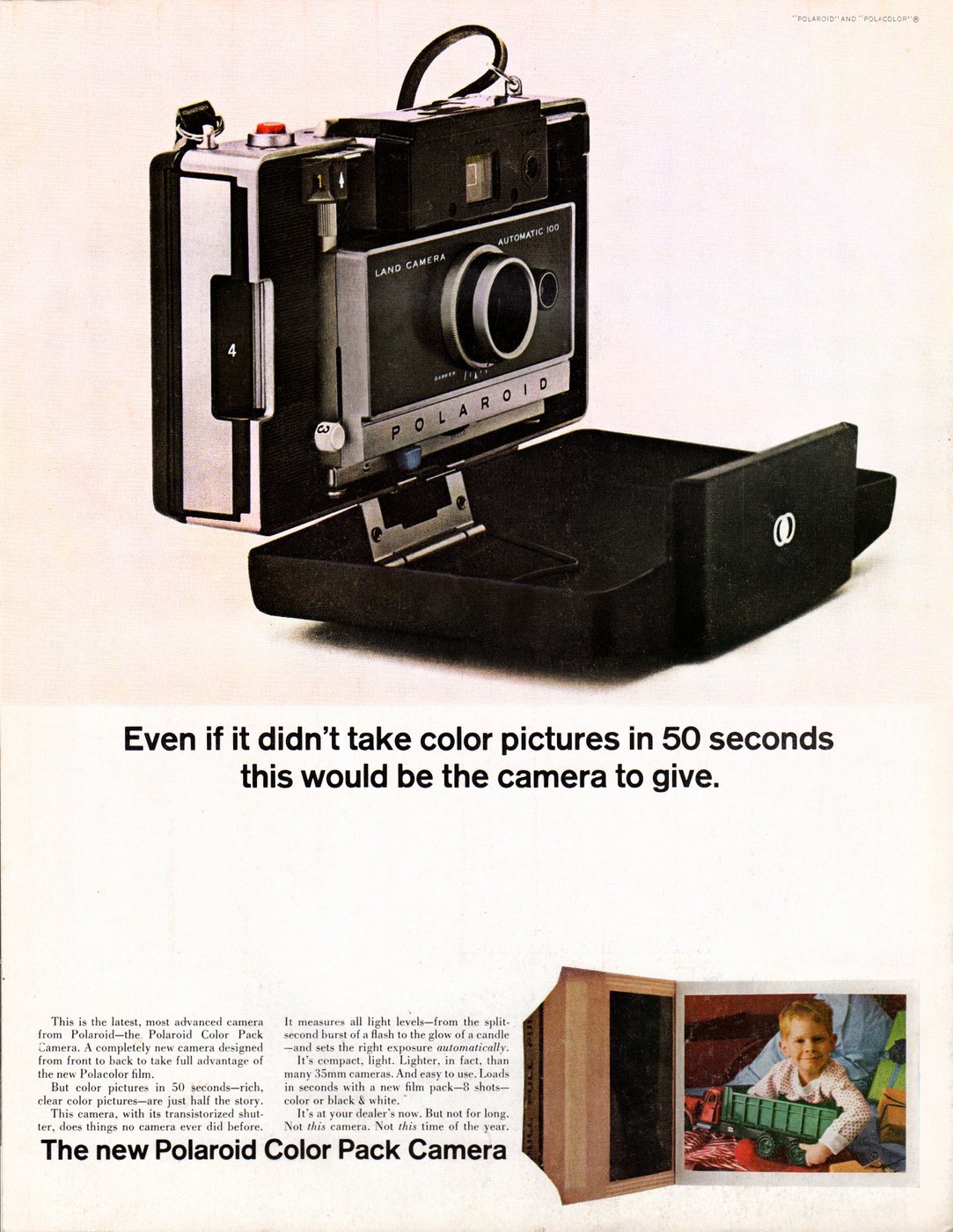
60 seconds. Under $60. (1965)
New economy model of the Polaroid Color Pack Camera. Same great film. Same fast loading. Same big color prints in 60 seconds (black and white in 10). Yet half the price of the original model.
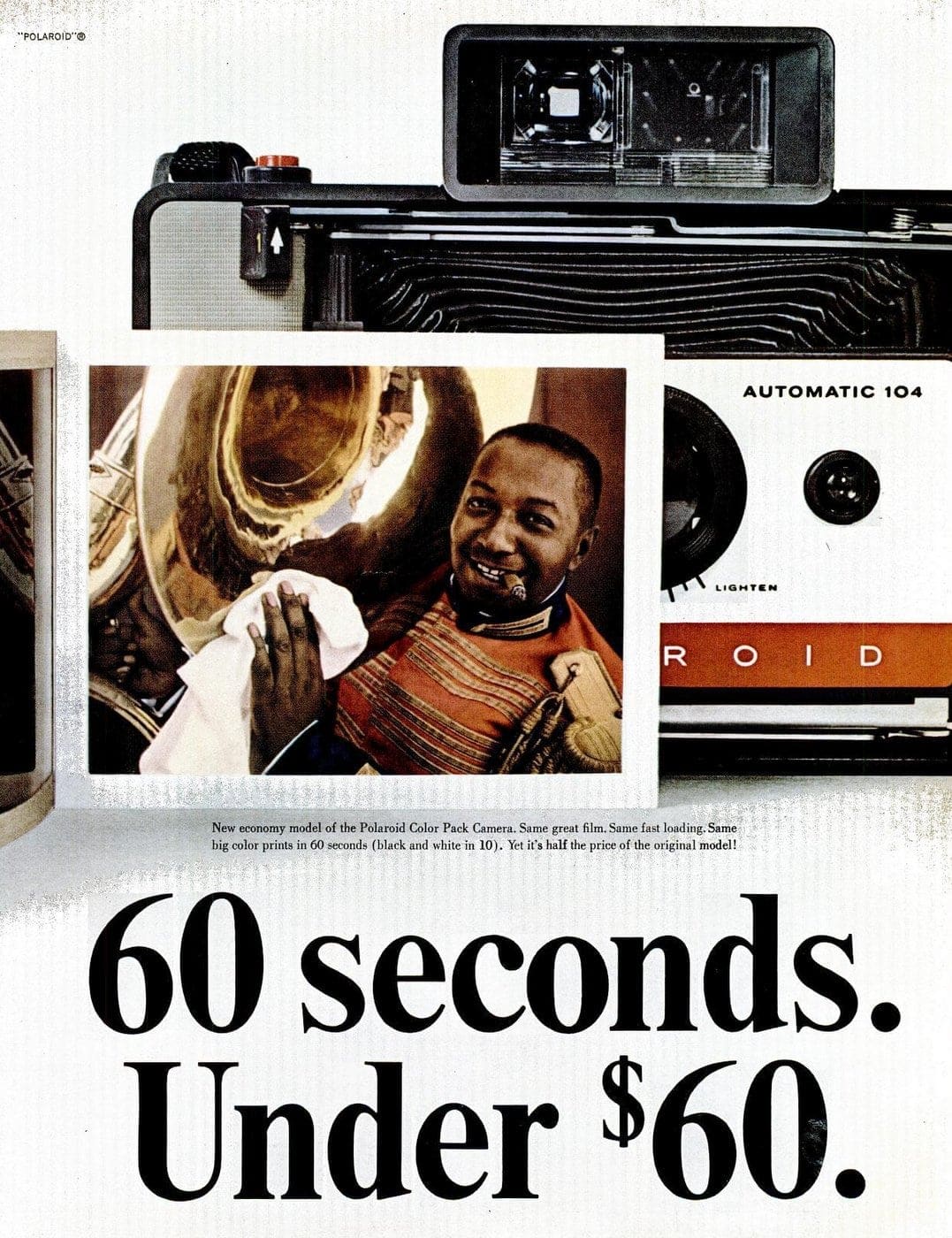
Four mid-60s Polaroids (1966)
Be a killjoy. Tell your wife what you want for Christmas. (And while you’re at it, tell her which model.)
1. The economy Color Pack Camera? Gives you big, beautiful color prints in 60 seconds, black and white in 15. (Is there any other way to take pictures?) It’s lightweight. Loads in seconds. Electric eye. Yet Polaroid has figured out a way to shrink the price. Under $60.
2. Maybe the moderate-priced one? Has many deluxe features the economy model doesn’t. like a sharp triplet lens and superimposed-image range and viewfinder. Can use the Polaroid Portrait Kit and many other accessories. Under $85.
3. How about the almost-luxury model? A great buy. You get most of the important features of the deluxe Color Pack Camera. Even the same brushed chrome body. But the shutter housing is metal and plastic instead of chrome, the strap nylon instead of leather. Includes flashgun. Under $125.
4. Maybe even the deluxe model? This is the finest automatic camera Polaroid has ever made. It can do things none of the others can: make black and white pictures indoors without flash, make automatic time exposures up to 10 seconds. Brushed chrome finish, supple leather strap: a beauty. Includes flashgun. Under $150.
Oh. About your wife. You’ll square it with when you start taking all those pictures of the kids.
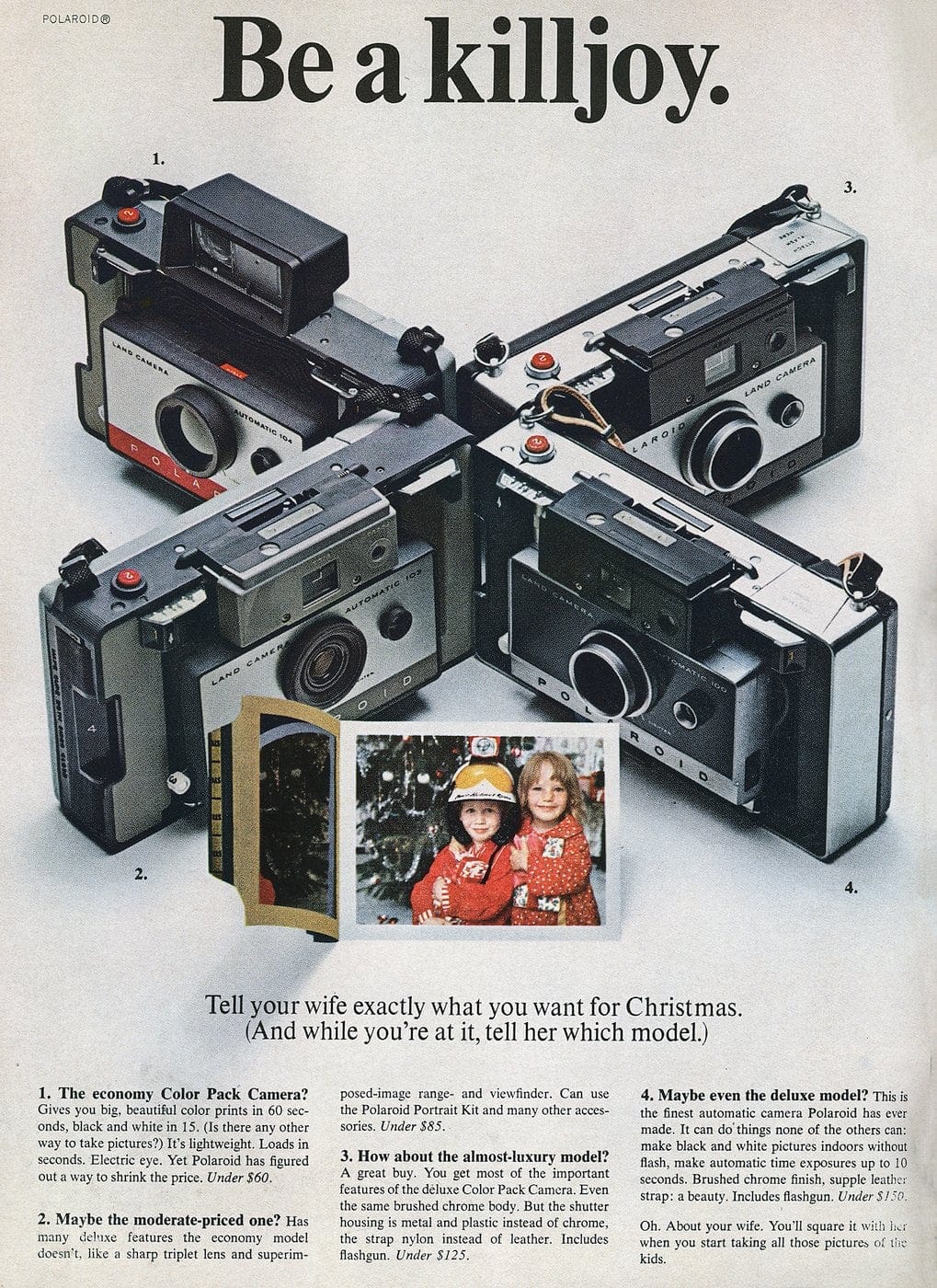
Polaroid Color Pack Camera: Goodbye, Charlie. (1968)
The next boss who hands out a gold watch might just get a punch in the nose. After all, a man who’s retiring wants something to fill his time, not to tick it off.
Why not a Polaroid Color Pack Camera?
The very first Monday he doesn’t have to make the 8:02, he can start enjoying it. He’ll pop in some film and start shooting. (The electric eye does the work.) In 60 seconds, he’ll start peeling off beautiful color prints.
The camera shown here is the finest automatic Polaroid has ever made. Superb Zeiss Ikon single-window range- and viewfinder. Transistorized shutter that lets you make black-and-white pictures indoors without flash, perfect time exposures up to 10 seconds automatically. A sharp triplet lens, 2 exposure ranges for color, 2 for black-and-white. In other words, the works — including a flashgun.
It costs something under $160 — more than three times as much as the lowest-priced model. But nothing’s too good for old Charlie, right?
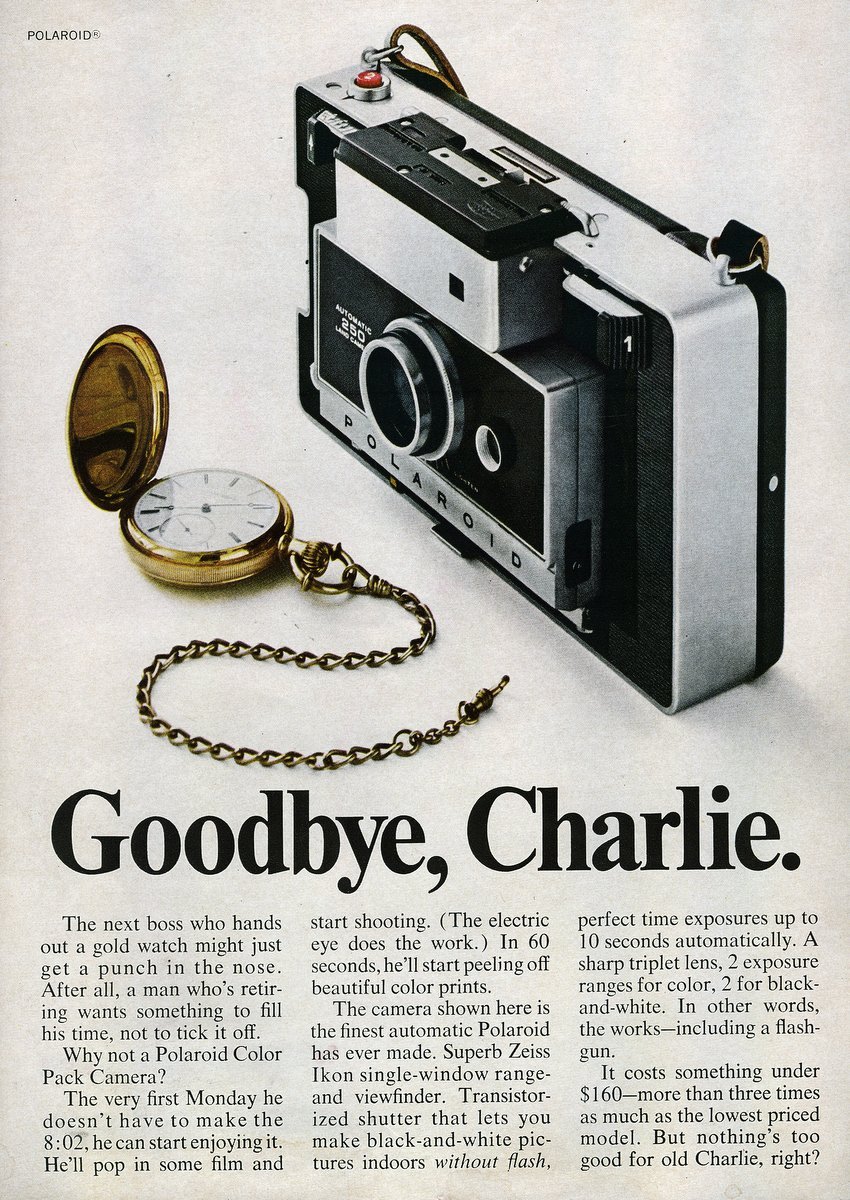
The 60-second excitement (1968)
It’s everywhere. Do you have your Polaroid Color Pack camera? (At Christmas)
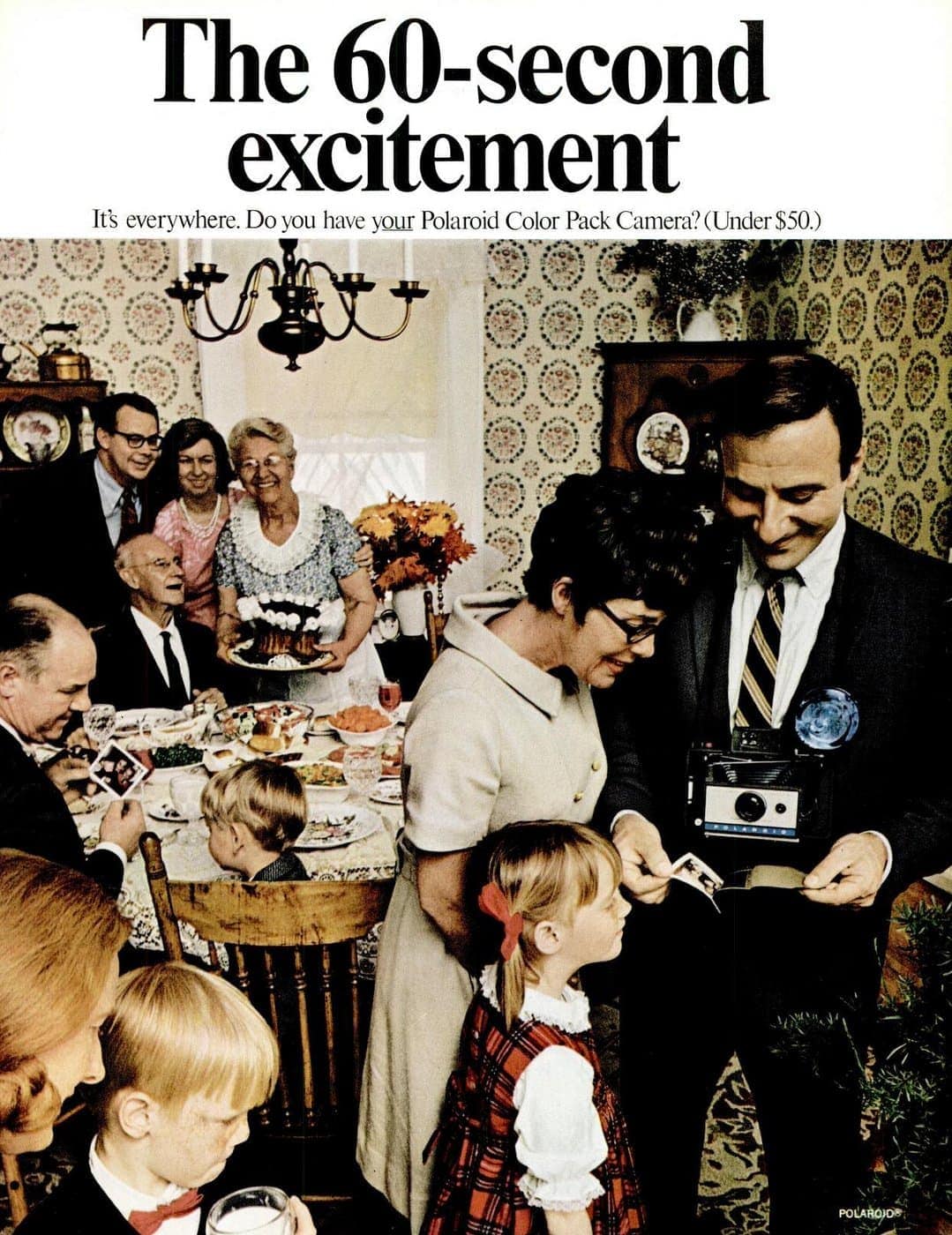
Now Polaroid takes the next step. (1969)
We’ve done it. The camera that calls you when your picture is ready. This is the Countdown 350. One of the most automatic cameras in the world.
The moment you shoot, it starts making decisions for you. The electric eye tells the electronic shutter how much light to let in. Pull the film packet, and the electronic timer beeps the instant your picture is ready.
It’s one of the most versatile Polaroid Land cameras ever made. You can take black-and-white shots indoors. Without flash. Automatic time exposures. Or even portraits and close-ups with special attachments. And it’s one of the finest we’ve ever made. It has a sharp 3-element lens. And a Zeiss Ikon double image rangefinder-viewfinder.
There are four great cameras in Polaroid’s Countdown line. Starting at under $80. (The Model 330.) And they all beep or buzz to tell you when your picture is ready. Now you’ve heard everything.
The Countdown 350. So automatic it even calls you when your picture is ready. “Beep.”
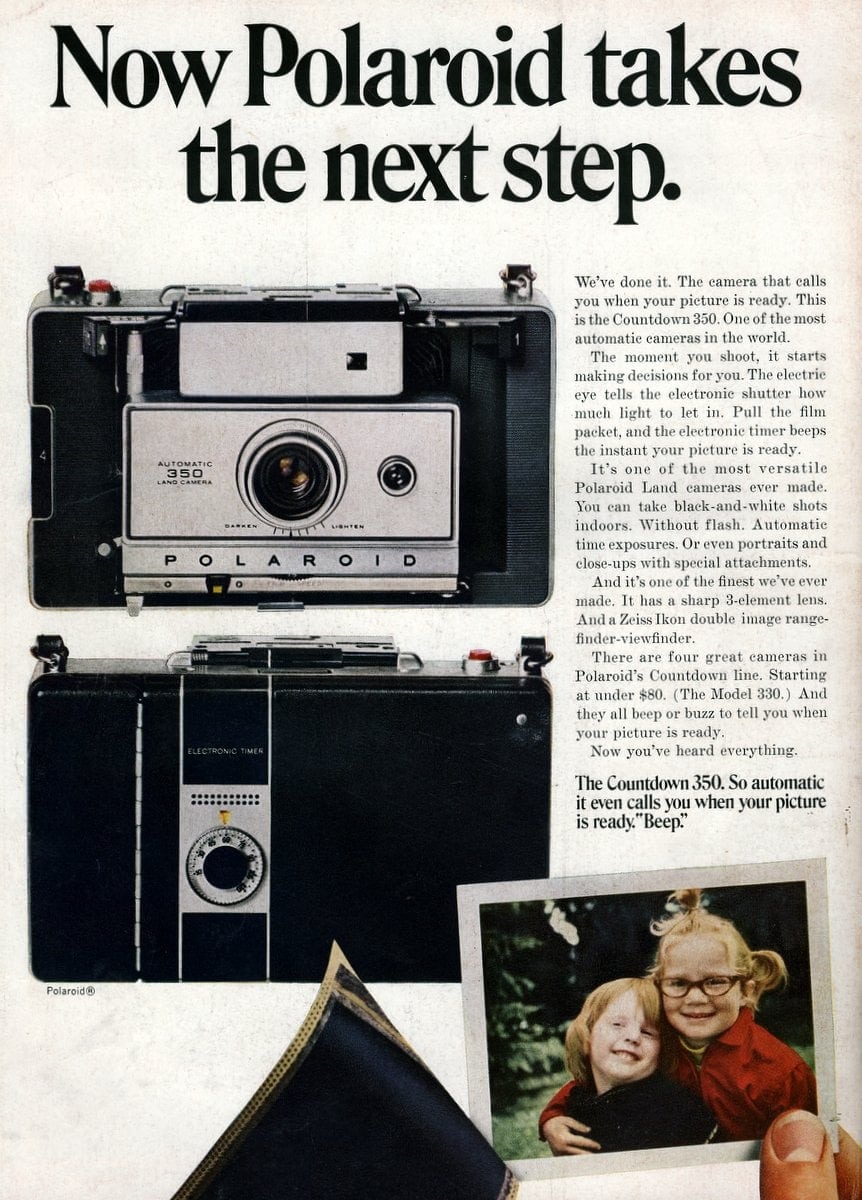
Kodak Swinger Sentinel Land Camera (1969)
The new Swinger Sentinel takes beautiful black and white pictures in 15 seconds.

The Kodak Colorpack II Land Cameras (1969)
Color pictures in a minute. Automatic exposures. 3-element lens for sharp pictures. And a built-in flash for 4-shot flashcubes.
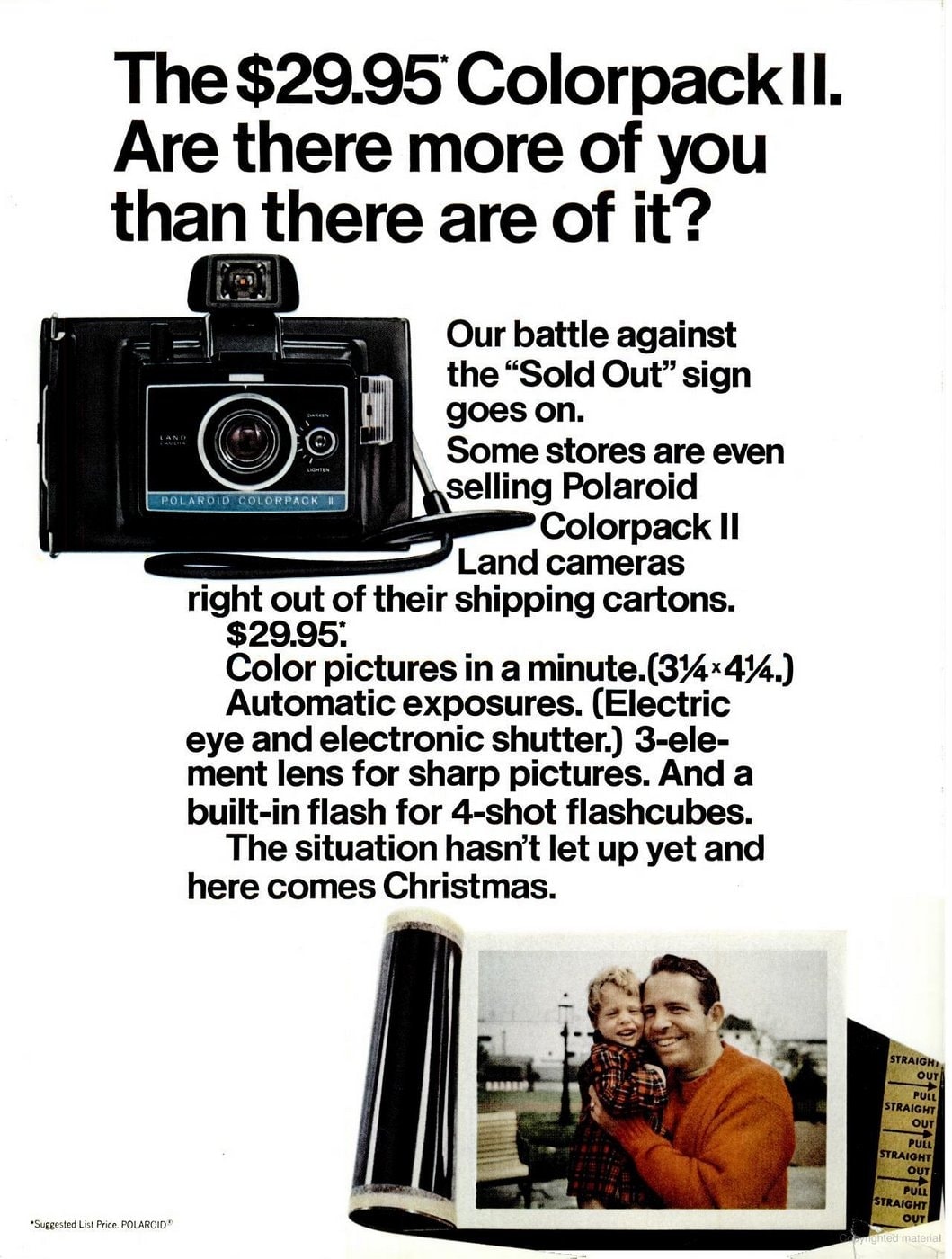
Polaroid’s Square Shooter (1971)
Polaroid’s square picture: The money you save on 8 almost pays for 2 more.
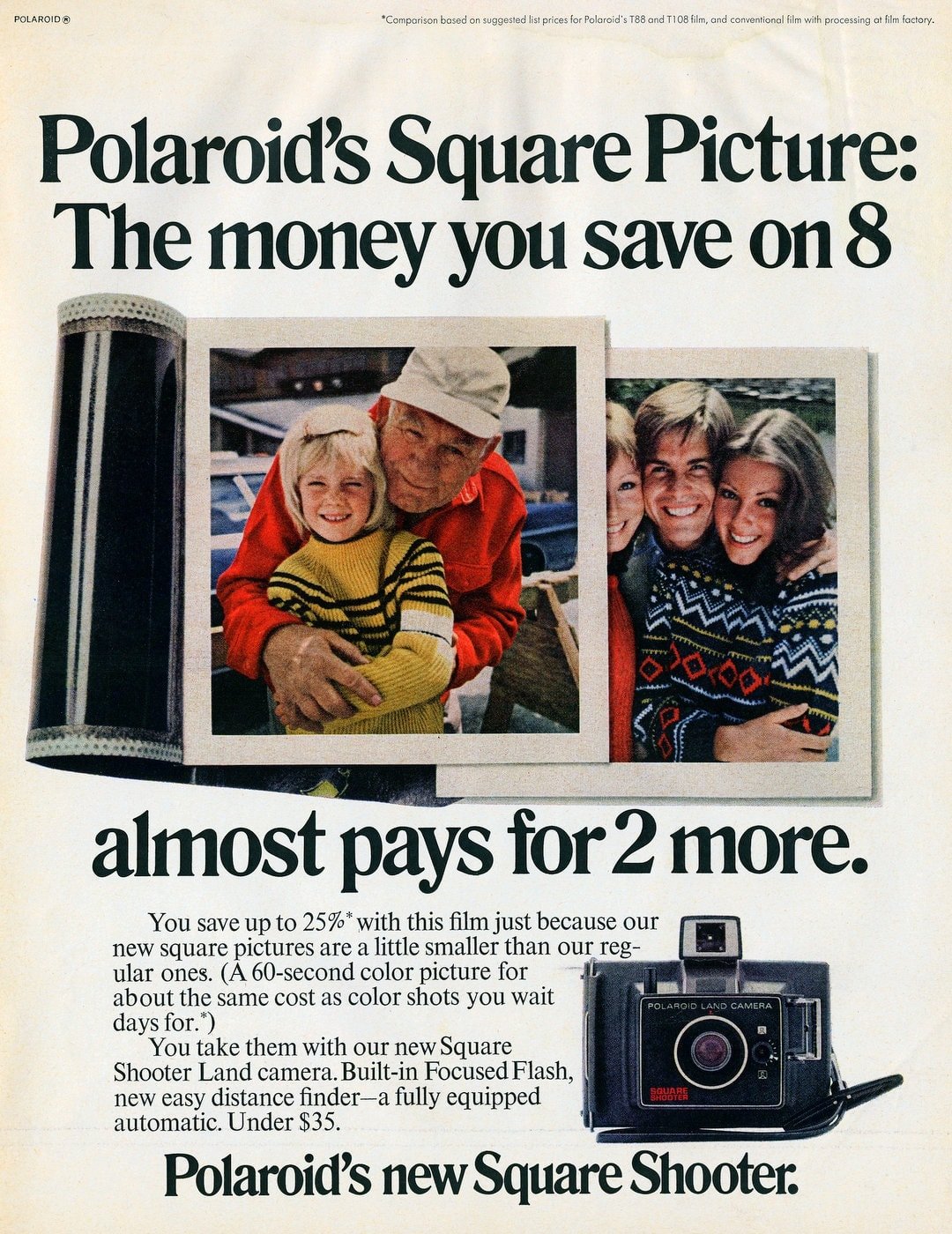
Polaroid cameras at lower prices (1972)
Big shot, Square Shooter, 420-450 land cameras all for under $20-$200.
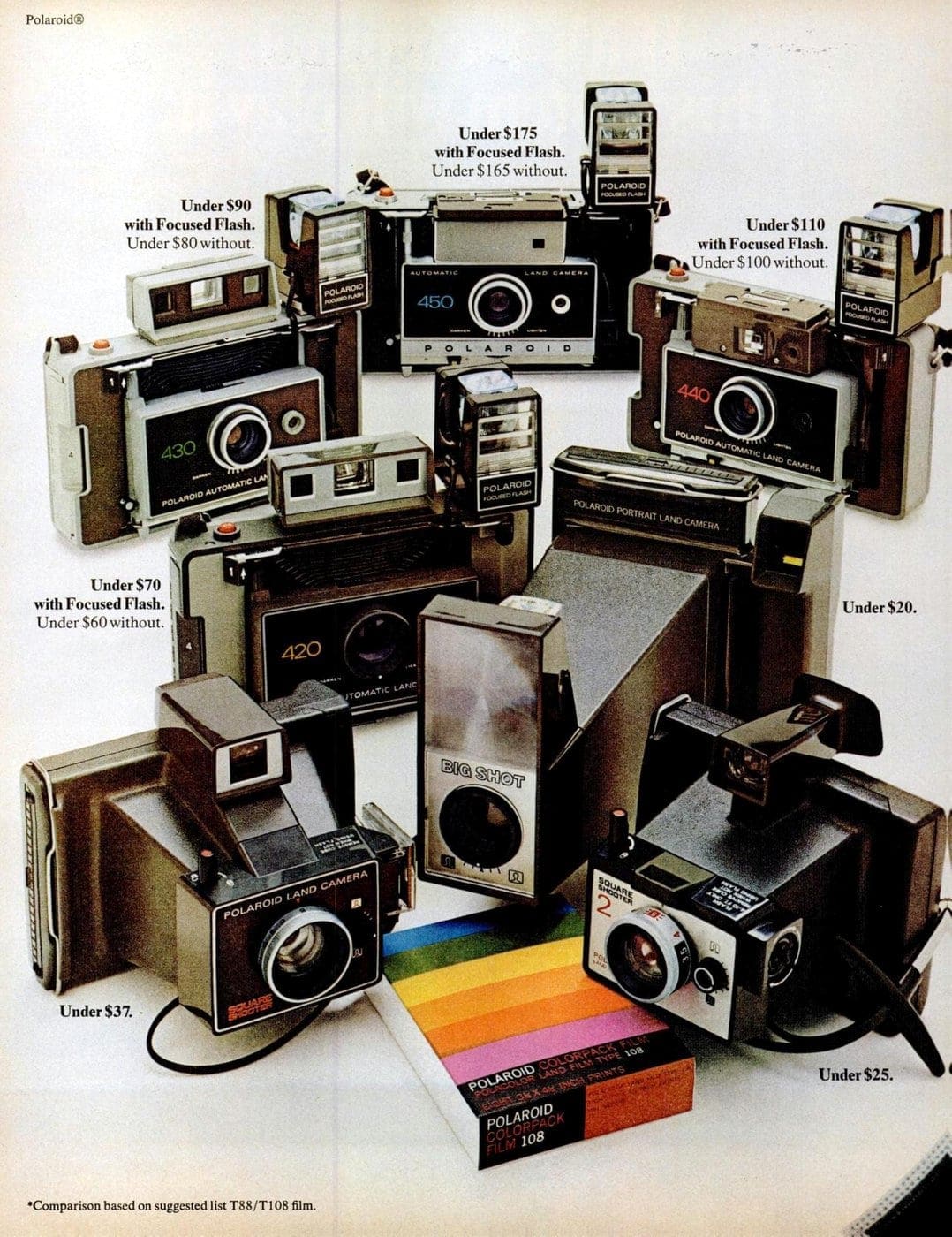
MORE: Fotomat: The famous, fabulous drive-up photo stores of the ’70s & ’80s
Various types of vintage Polaroid cameras (1973)
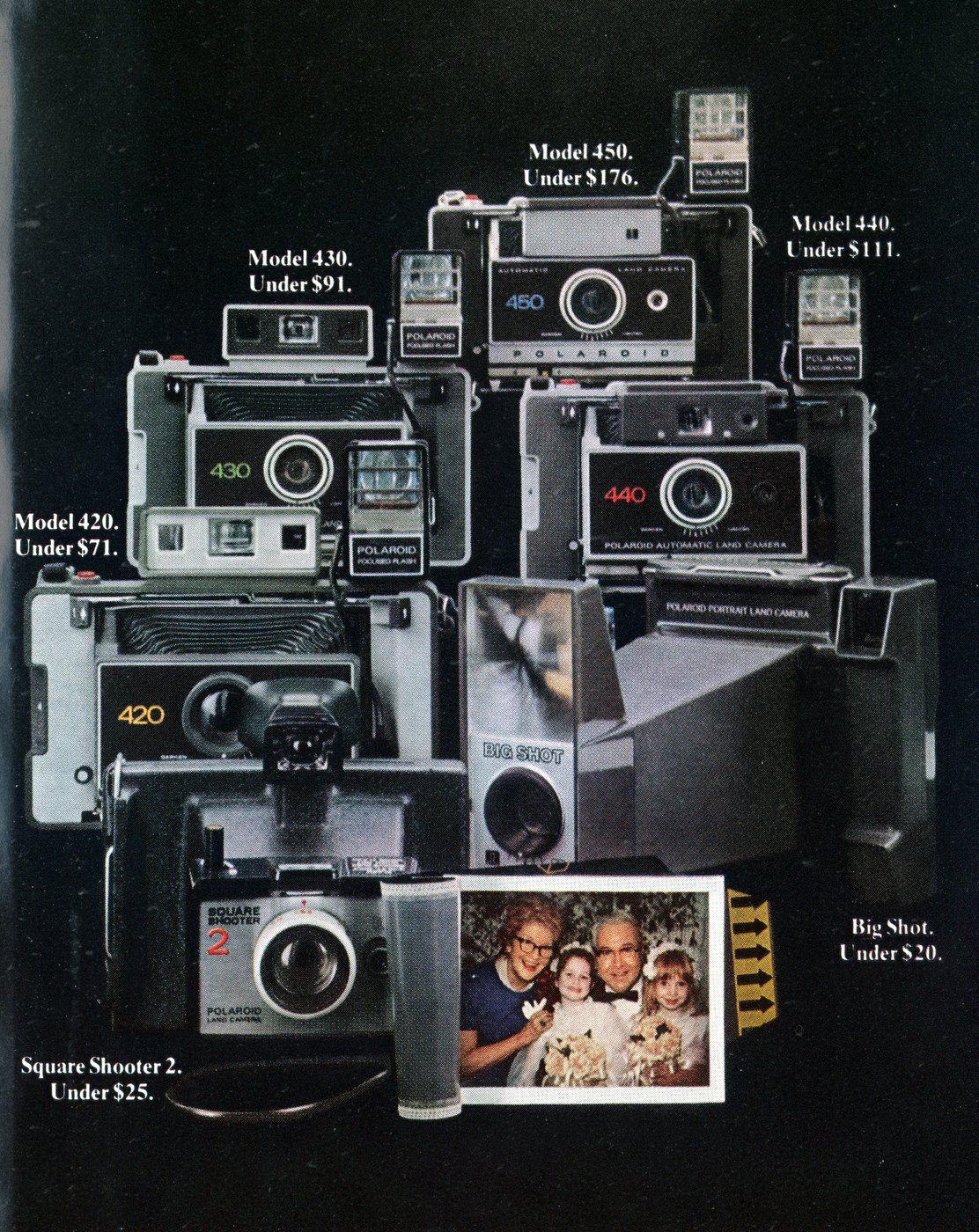
The Polaroid minute (1973)
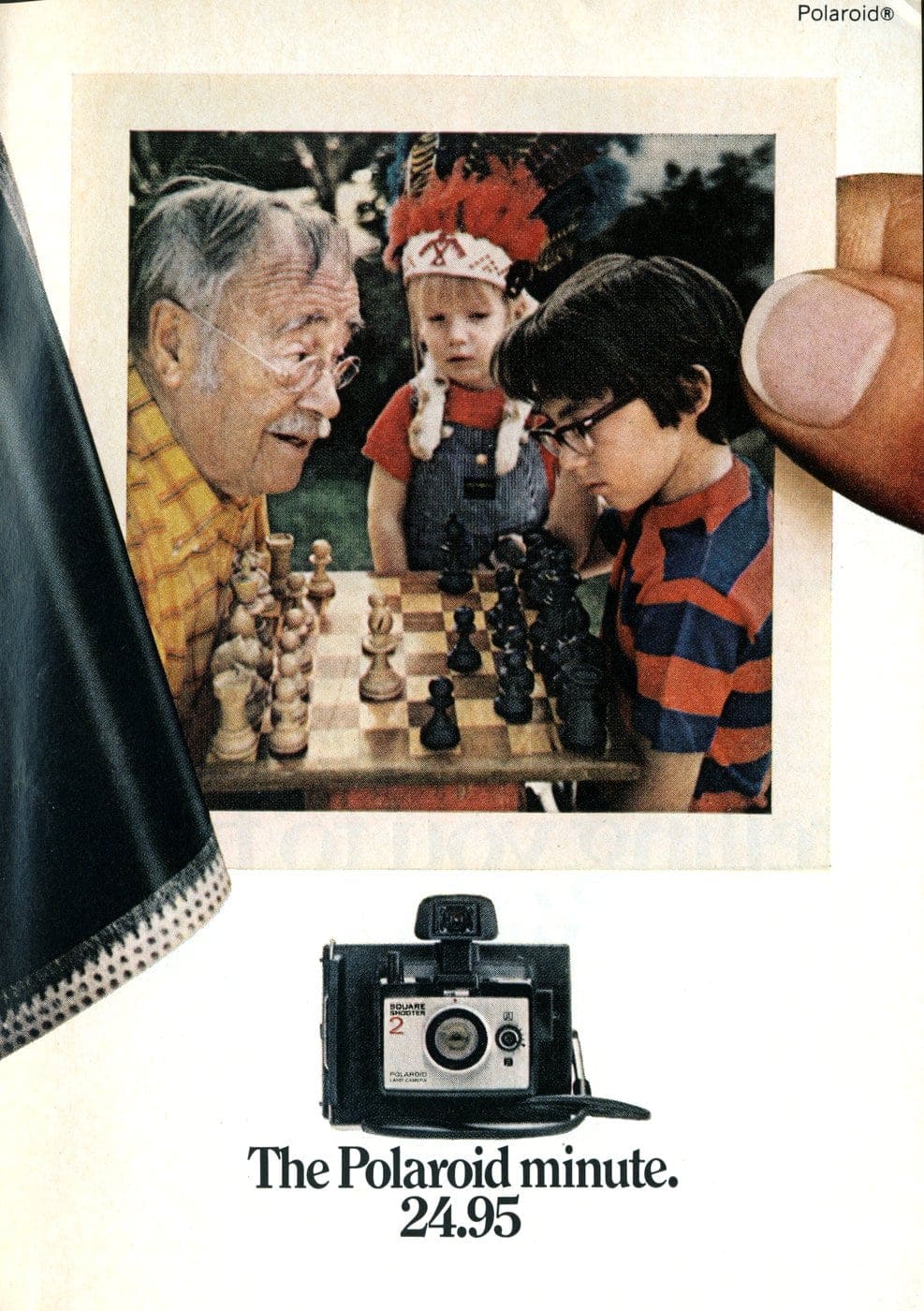
The 60-second masterpiece. (1976)
Polaroid’s Super Shooter for the Super Colors.
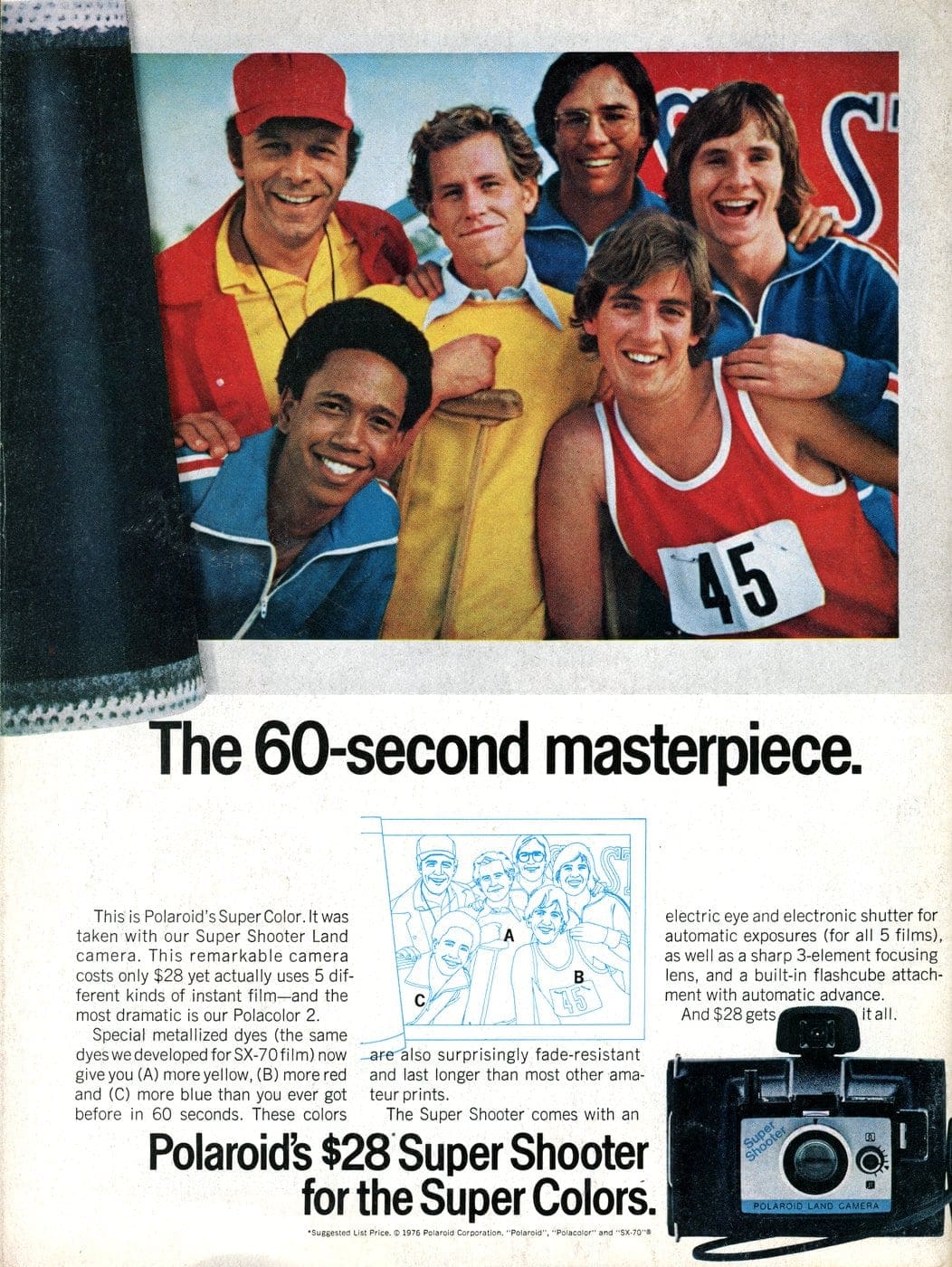
The Handle – A Kodak instant camera (1977)

Bzzz! It’s automatic! (1977)
Only one motorized instant camera gives you brilliant color by Kodak.
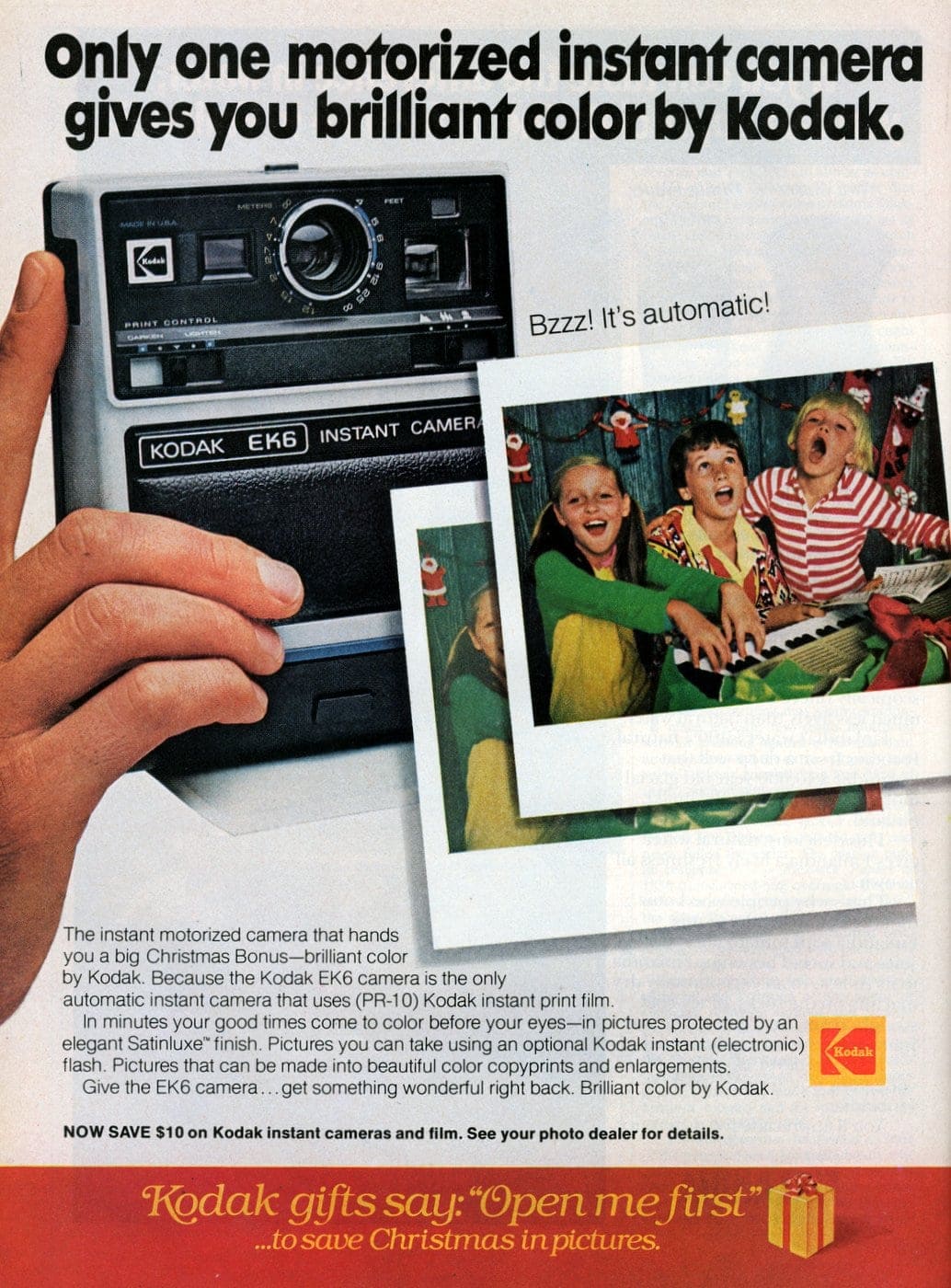
Watch it happen with Polaroid’s Pronto (1977)
Three popular Pronto! models for sharp, clear SX-70 pictures.
Polaroid’s MinuteMaker (1977)
The least expensive way to enjoy instant photography
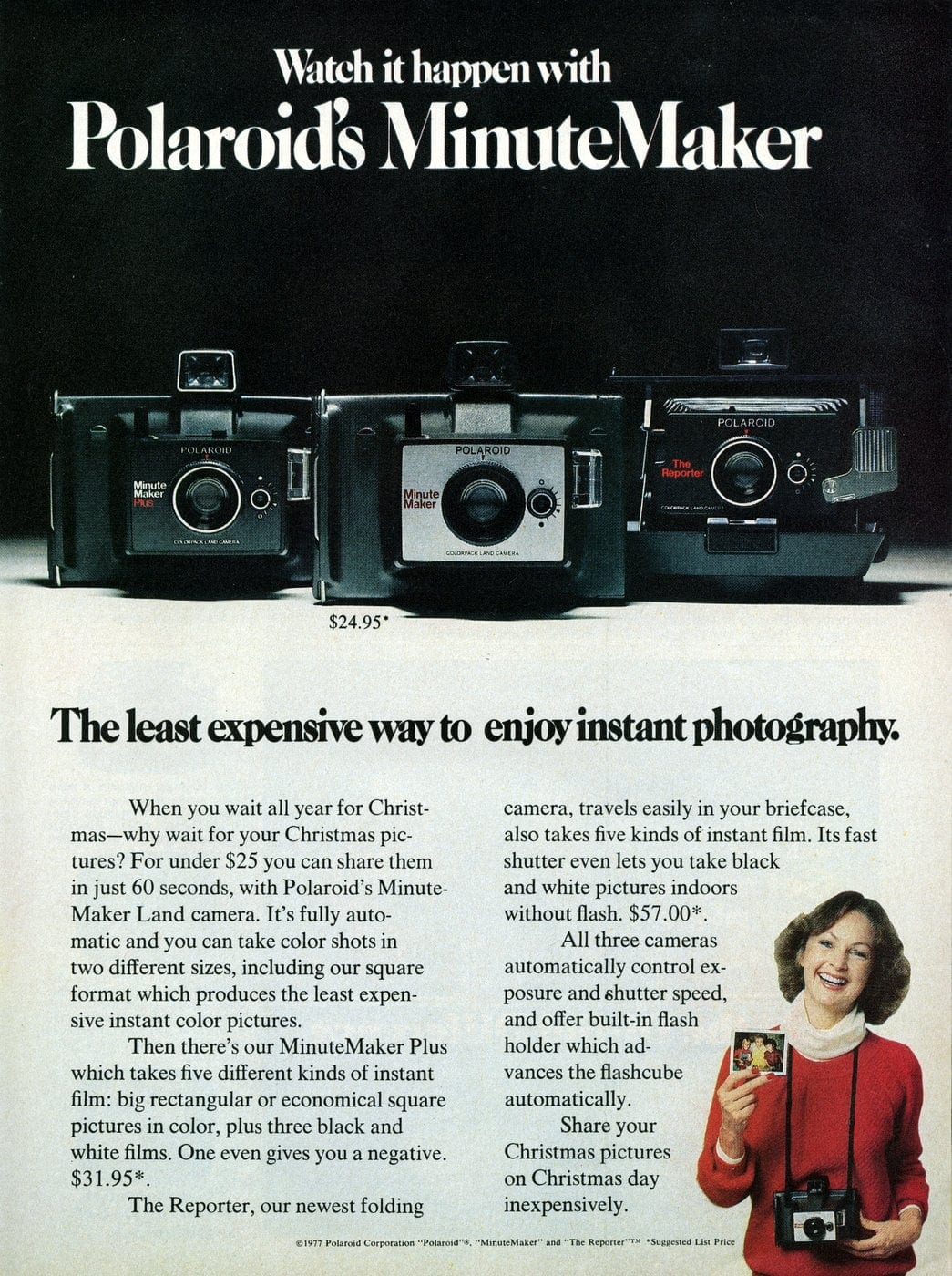
Polaroid’s OneStep camera (1977)
New from Polaroid. The world’s simplest camera… Press the button and the picture’s in your hand! You never focus, never set anything. Just aim and shoot.
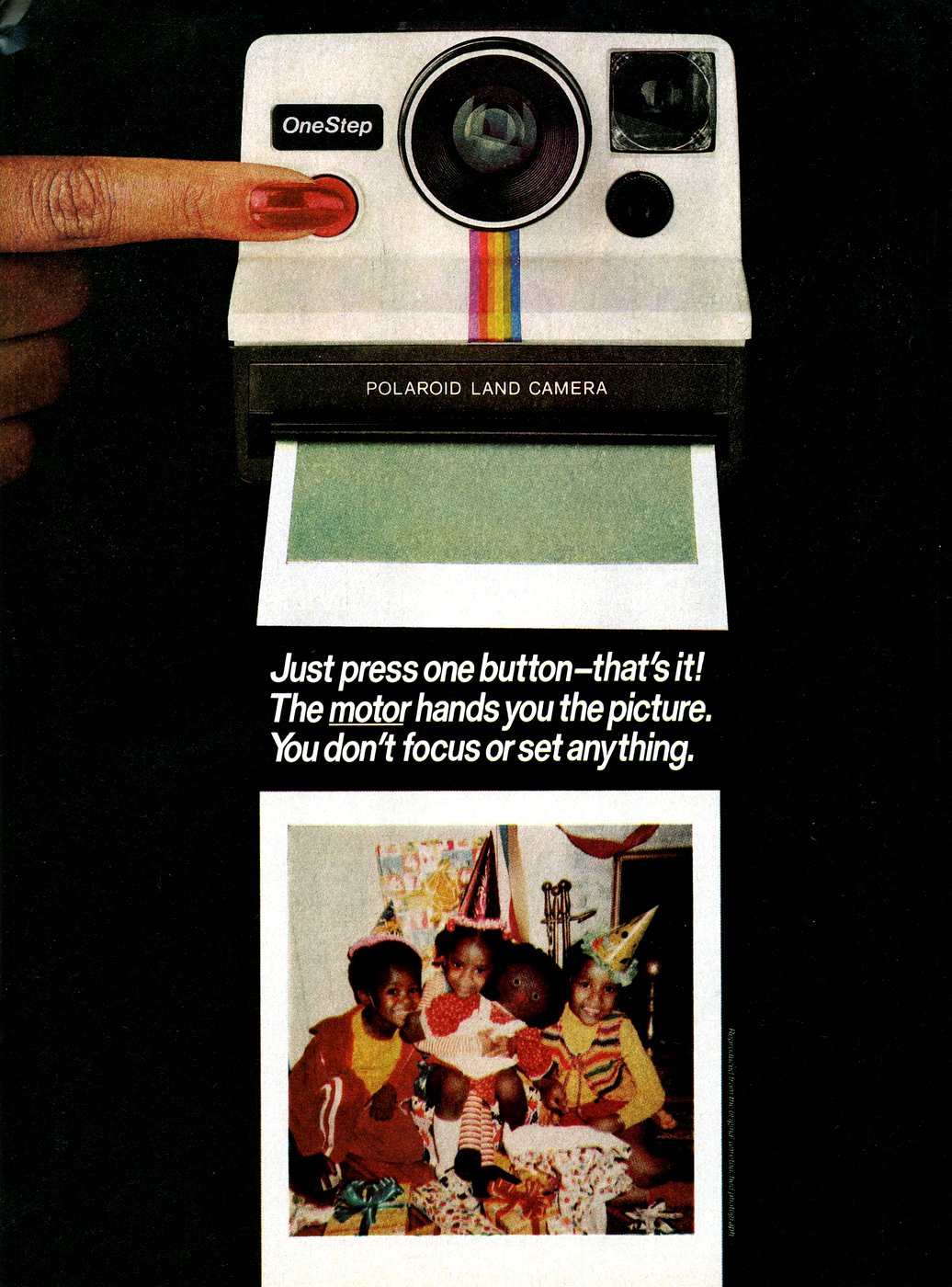
Polaroid’s SX-70 (1977)
The finest instant camera in the world.
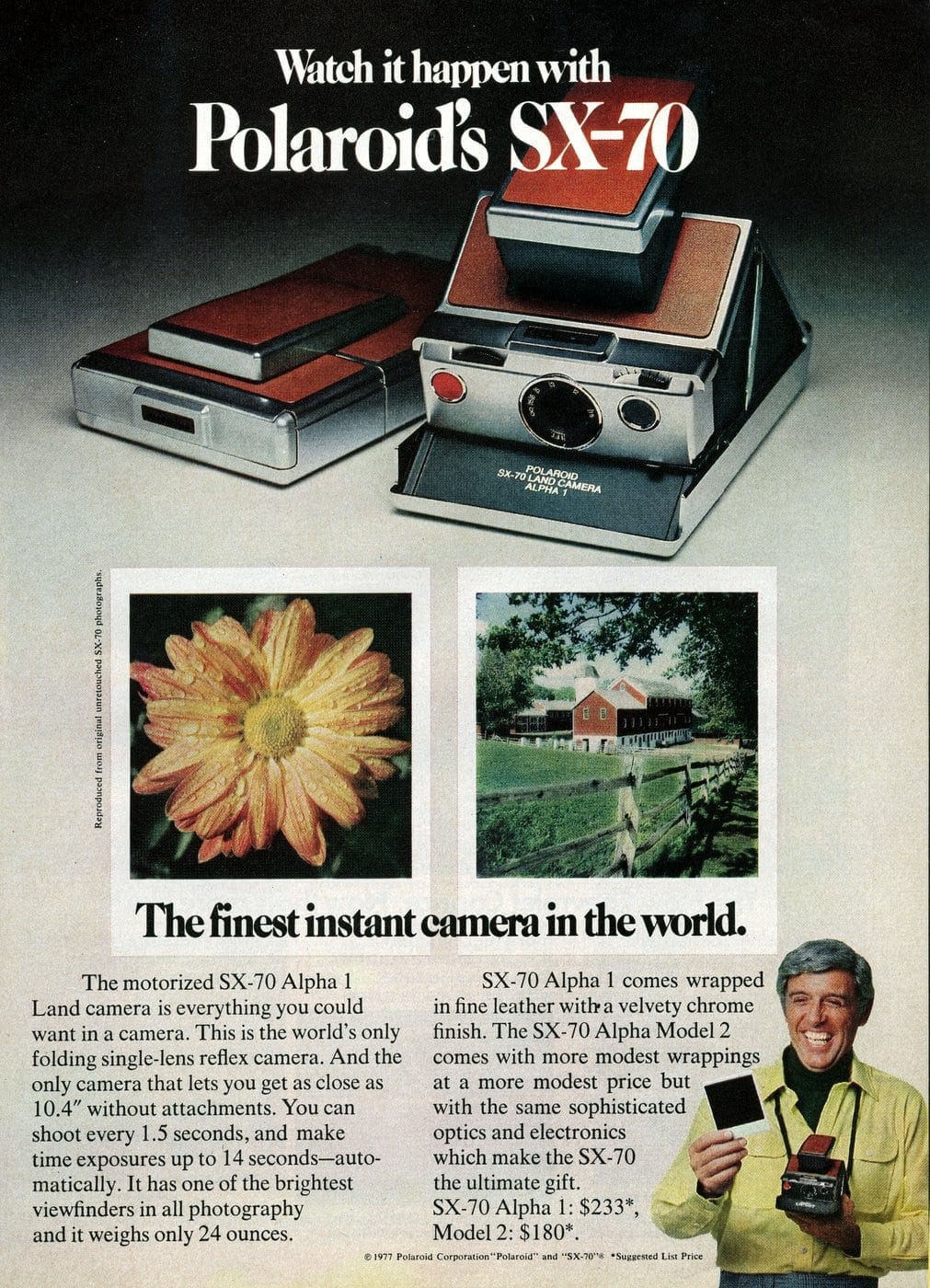
Polaroid’s SX Alpha-1 (1977)
How good is it? Decide for yourself. Let’s start with close-ups.
The only folding single lens reflex camera in the world. We got this remarkable picture from less than one foot away with a SX-70 Alpha 1 Land camera. Other cameras couldn’t do it without a special lens…
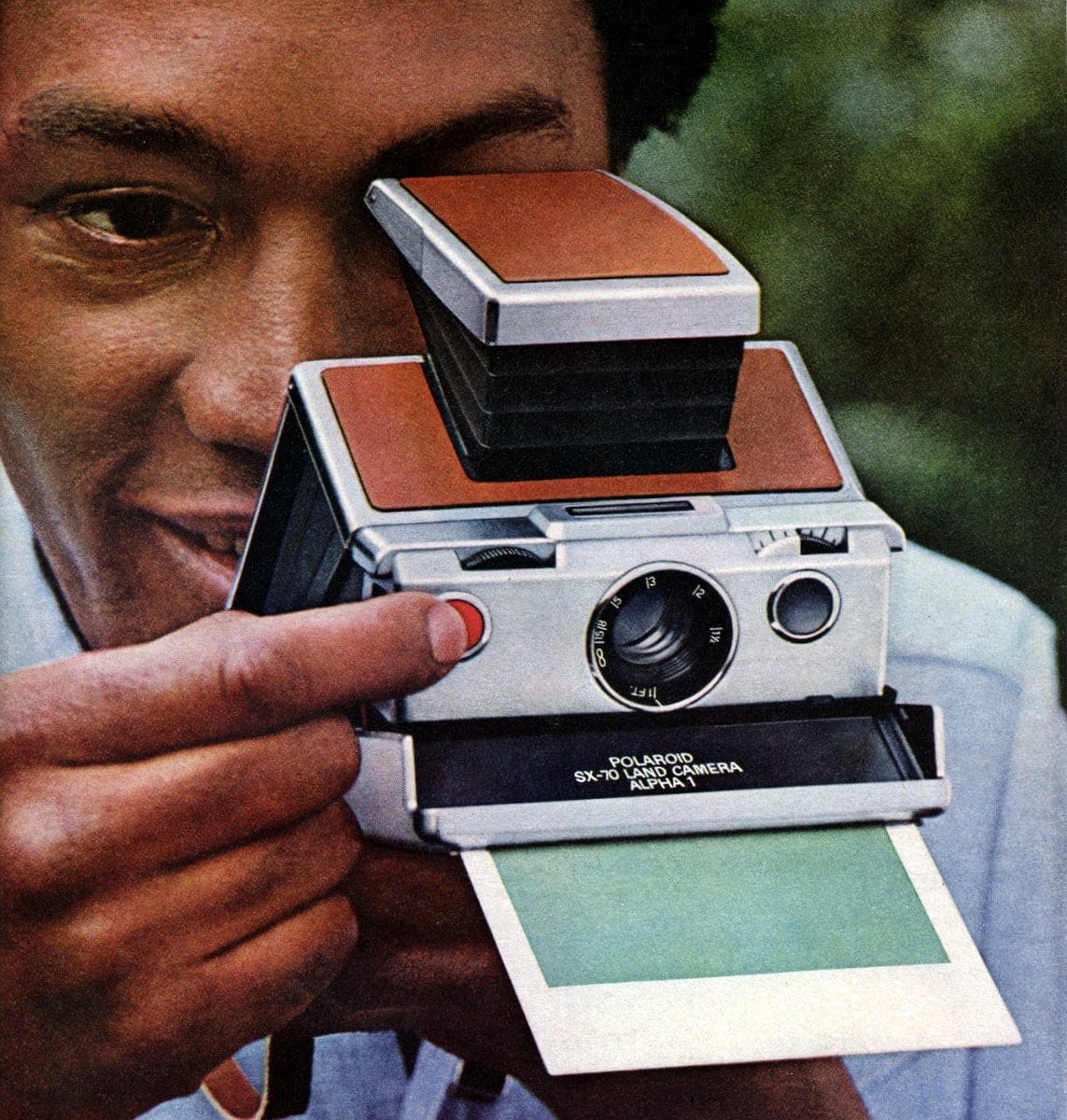
Polaroid’s SX-70 Alpha-1 Land Camera (1977)
It was only fitting that this camera be bound in fine leather. By all criteria, the SX-70 Alpha I is the unique single-lens reflex camera.
Such a camera should also look distinctive. So we bound it in fine leather, as one binds a classic book, and set it off with a velvety chrome finish. It folds to about 1- by 4- by 7-inches so you can carry it gracefully from your shoulder or easily in your pocket.
Inside, its sophisticated optics let you focus through the picture-taking lens to as close as 10.4″. You can take instant portraits, sequential pictures as fast as every 1-1/2 seconds, daylight flash pictures, even automatic time exposures to 14 seconds.
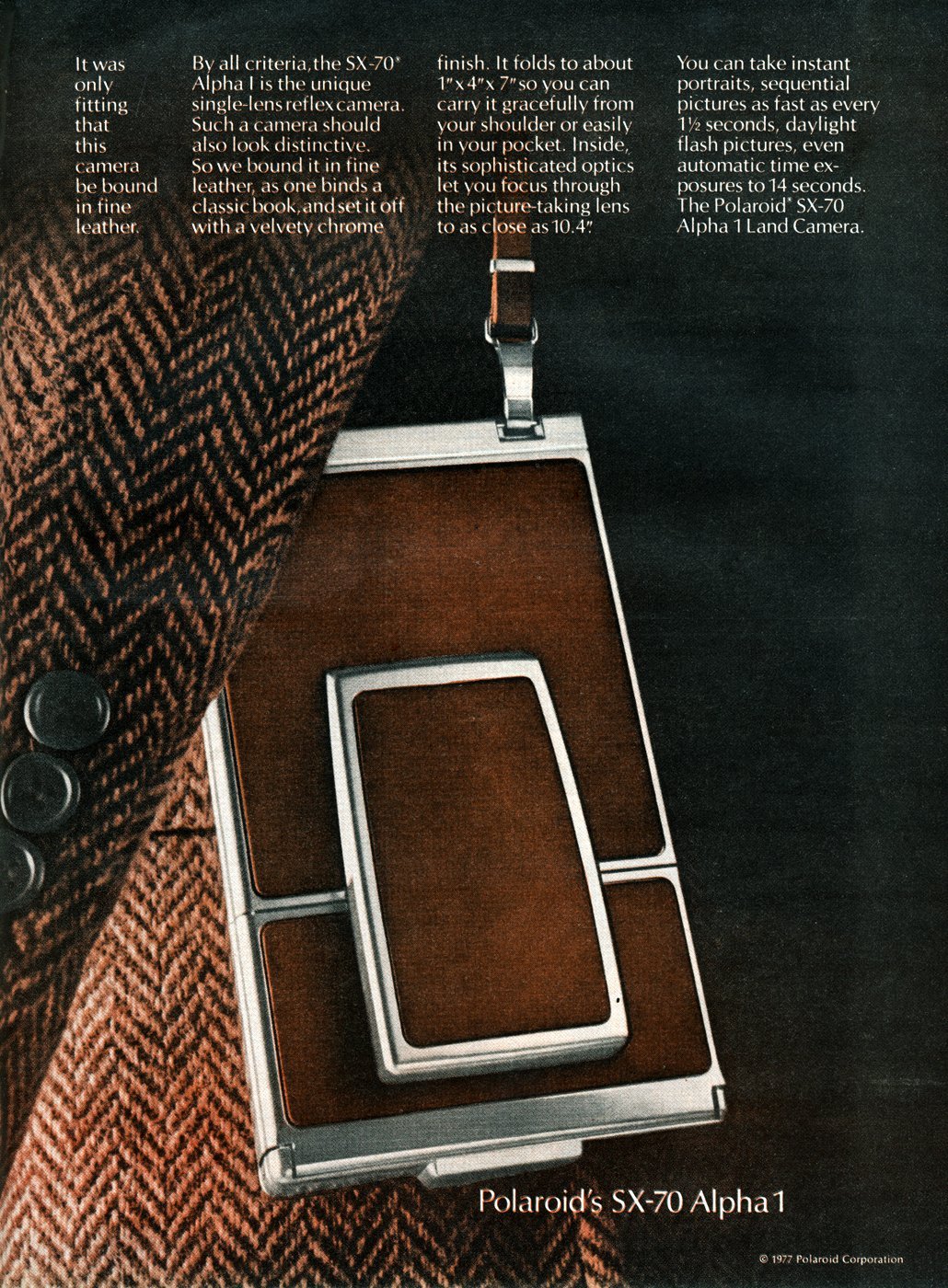
Kodak introduces Colorburst instant cameras (1978)
“The only low-priced, motorized instant cameras that give you this… bright, brilliant, bursting color by Kodak.” – Dick Van Dyke
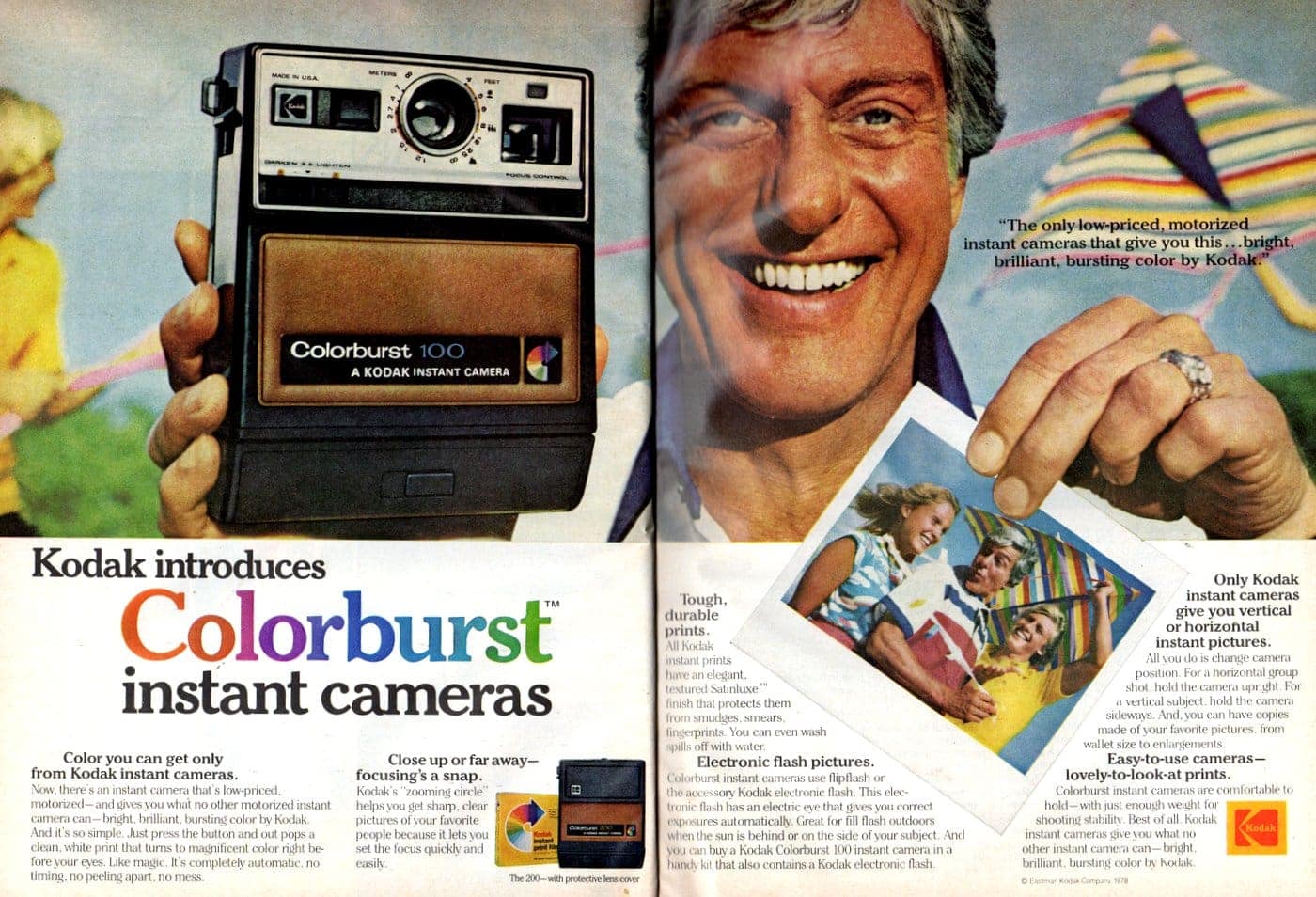
- FAST EASY AND FUN – This Point and Shoot the camera speed allows you to shoot a new photo while printing the previous shot. It also comes equipped with a light sensor that will automatically turn on...
- ONE TOUCH PHOTOGRAPHY - Capture and print every moment, all on one device. The camera prints full-color print ZINK Zero-Ink smudge-proof, water- and tear-resistant photos, or allows you to save them...
- READY, SET, STICK Print all your favorite memories on sticky-backed 2” X 3” ZINK Zero Ink photo paper. Print your photo, peel off the backing, and paste your sticker onto anything in seconds.
Polaroid’s SX-70 Sonar OneStep (1979)
Just press this button. Sonar automatically focuses the lens.
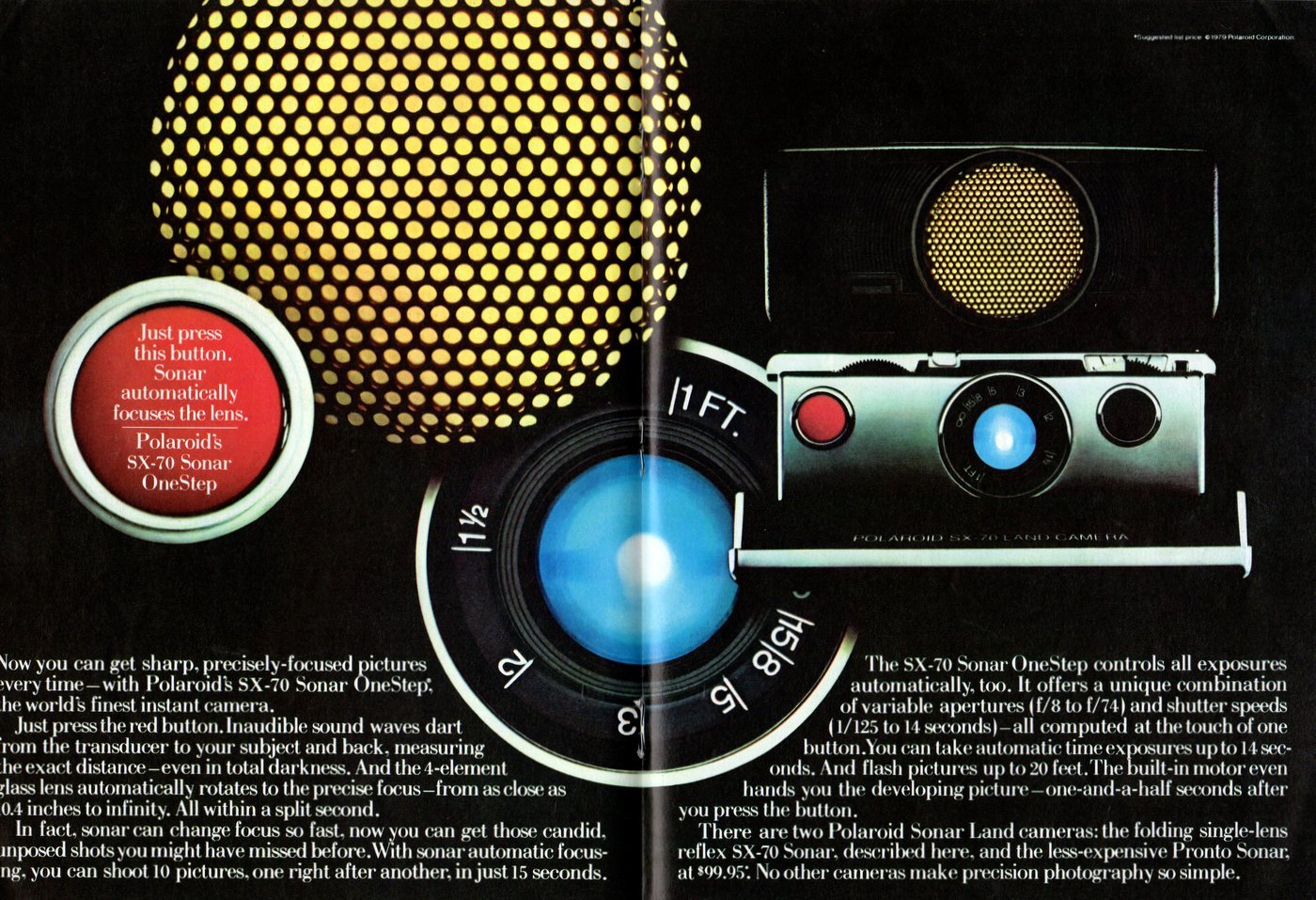
Colorburst 50 (1979)
With the new Kodak Colorburst 50 Instant camera, you just aim, shoot, and watch the feelings grow.

Kodamatic, with David Copperfield (1982)
See Kodak’s amazing new Kodamatic — perform feats of magic before your eyes. Now you see them, now you do!
Any light’s automatically right for beautiful pictures within the range of our uncanny electronic flash every time.
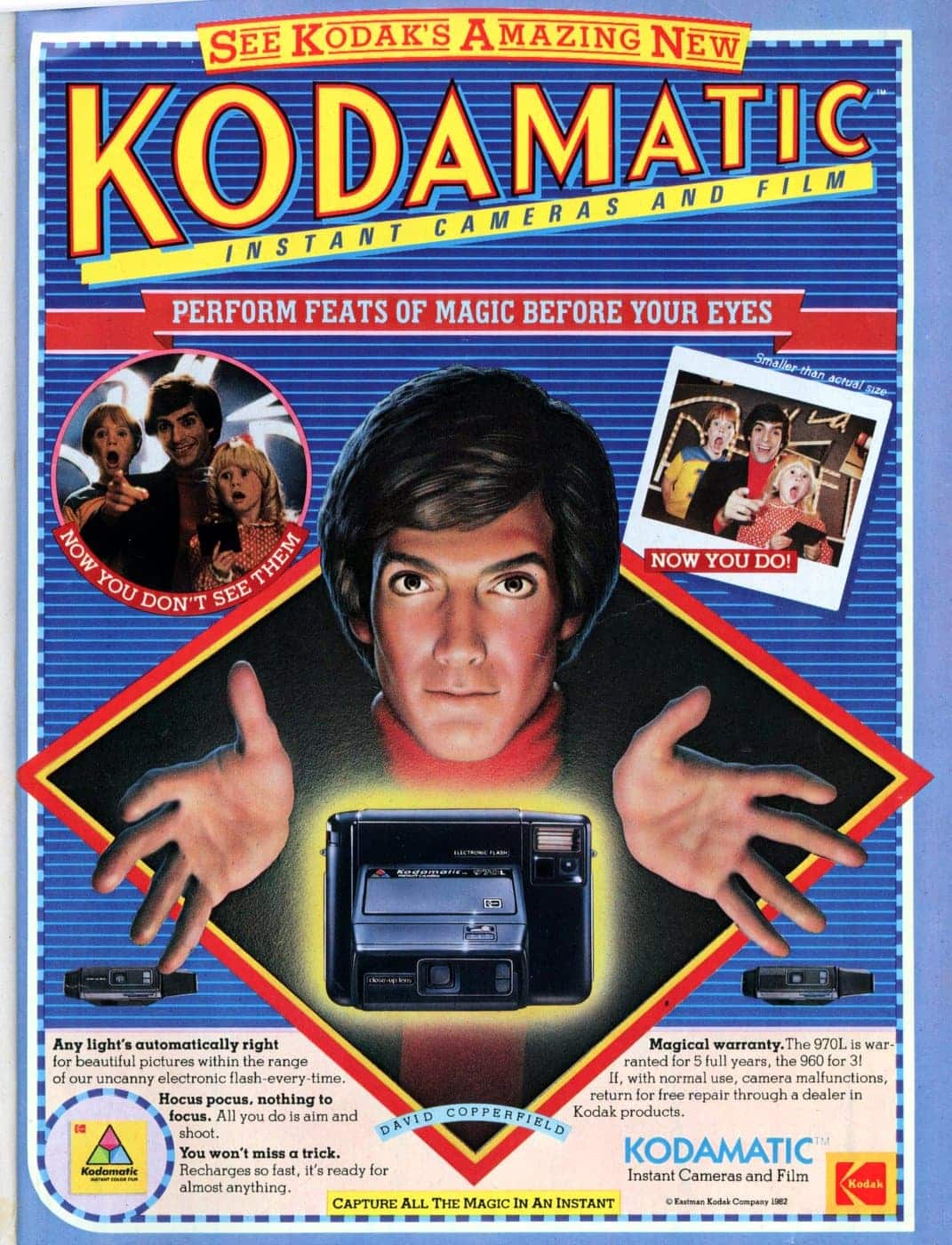
- Hybrid instant film camera
- 10 Lens x 10 Film Effect Options = 100 Ways of Expression
- Built-in selfie mirror so you’re perfectly framed for a selfie, Dual shutter buttons – portrait and landscape
Spectra: Give, and take (1987)
This holiday season, give the Polaroid Spectra System, and take instant pictures like you’ve never seen before.
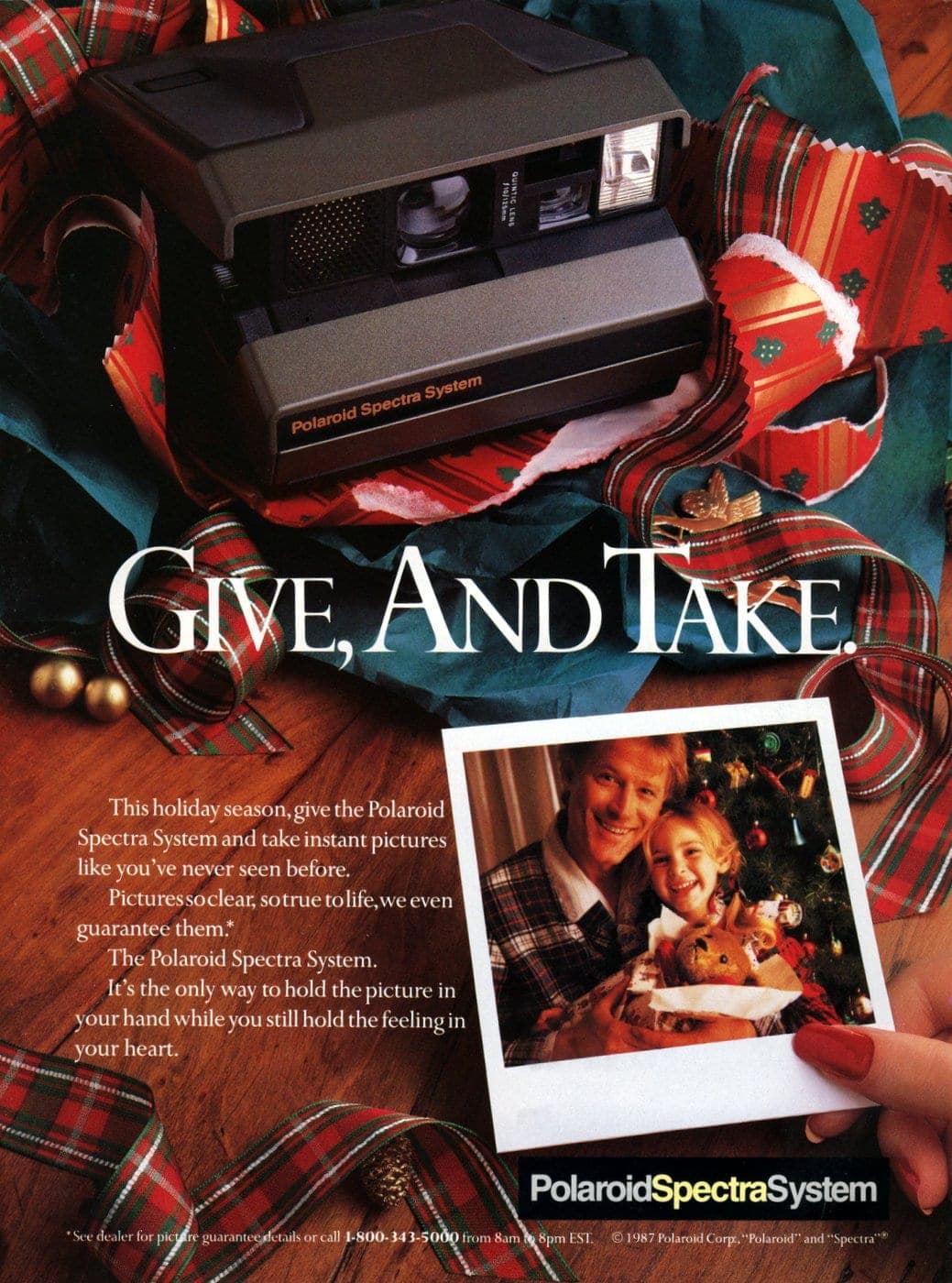
MORE CAMERA FUN: The Kodak Disc camera debuted in 1982, but couldn’t live up to its promise. Here’s the story.























2 Responses
I received one in 1976 for my High School Graduation. THE Problem…TEN PICS cost $10 In 1976 for a 18 year old? That was lots of money. BUt O THE PICS WERE GREAT!
A friend of my dad’s had one of the original Polaroid SX-70s, which totally blew me away. Later in the 1970s, I got a One Step for Christmas. It was a lot of fun as everyone enjoyed watching the photos develop. But Joel is right; the film was very expensive, so you had to choose your photo subjects carefully. Plus it was bulky to carry around. My wife had a Kodak Colorburst, which was one of the cameras Kodak had to buy back due to patent infringement. We sent it in and got $20 for it, which was big money for us at the time.